Low interest personal loans can be a great financial tool for those looking to consolidate debts or fund personal expenses. These loans offer competitive interest rates that are often lower than credit card interest rates, making them a popular choice for borrowers.
Personal loan lenders consider factors such as credit score, income, and debt-to-income ratio when determining the interest rates for personal loans. By consolidating credit card debt with a low interest loan, borrowers can potentially save money on interest. They also simplify their monthly payments by having one fixed monthly payment.
Debt consolidation is a common use for low rate personal loans, but they can also be used for home improvements, medical expenses, or other personal expenses. We are going to provide some of the best options below.
SoFi — Best For High Loan Amounts
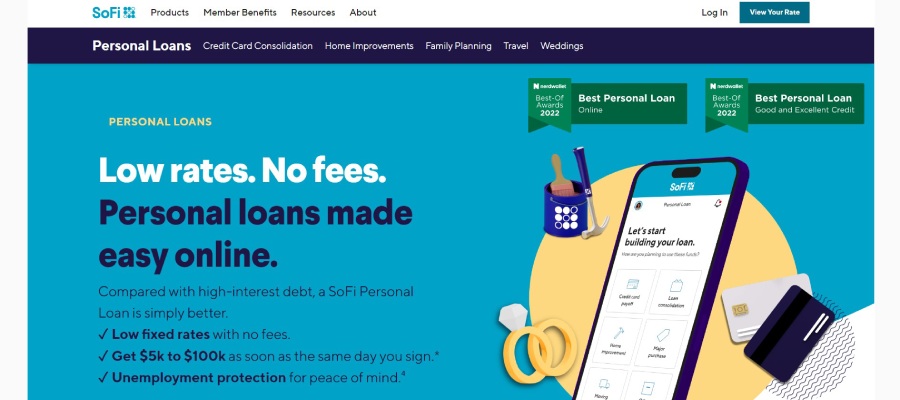
SoFi is a popular lender for high loan amounts, offering personal loans to borrowers looking to borrow money for various purposes. One of the reasons SoFi is considered one of the best personal loan lenders is its competitive rates, which are based on the borrower’s creditworthiness and financial history.
SoFi also offers a streamlined application process, and borrowers can often receive their loan funds quickly. In addition, SoFi has a minimum credit score requirement of 680. For those looking to consolidate debt, SoFi’s debt consolidation loans typically offer a lower interest rate than credit cards, potentially saving borrowers money over time.
Details
| APR | Min. Credit Score | Loan Amount | Repayment Terms | Process Time |
| 5.74% to 21.28% | 680 | From $5,000 to $100,000 | 2-7 years | 7-10 business days |
SoFi offers low-interest loans with competitive APRs, an appealing choice for borrowers who have good credit. With fast processing times and flexible repayment periods, SoFi is a top choice for high loan amounts.
About The Lender
SoFi is a leading online personal finance company that provides personal loans to borrowers with excellent credit. The lender offers unsecured loans with great rates and flexible terms, making it an attractive option for those seeking loans with low interest.
While SoFi does require a credit score of at least 680, the lender may still consider borrowers with less-than-perfect credit. SoFi’s repayment periods range from two to seven years. The lender does not charge a prepayment penalty.
Additionally, SoFi offers loan amounts up to $100,000. Furthermore, there is no origination fee. With its reliable reputation and excellent customer service, SoFi is a top choice for borrowers seeking personal loans.
Eligibility Criteria
To be eligible for a personal loan from SoFi, applicants must have a minimum credit score of 680. While SoFi primarily offers unsecured personal loans, borrowers with less-than-stellar credit may be required to apply for a secured loan.
To qualify for a secured loan, borrowers will need to provide collateral. This can be a car or a house. When assessing loan applications, SoFi takes into account factors such as income, employment record, and debt-to-income ratio.
While SoFi’s loans are often used to consolidate credit card debt, applicants are not required to have existing credit card debt to get a personal loan from SoFi. Overall, SoFi’s eligibility criteria are designed to ensure that borrowers are financially responsible. They have to be able to repay their loans.
Advantages And Disadvantages
Here are some of the pros and cons of SoFi:
Advantages:
- Low-interest personal loans: SoFi offers personal loans to borrowers with good credit, making it an attractive option for those seeking to consolidate debt.
- Fast funding: Personal loan funding is typically processed within 7-10 business days, allowing borrowers to receive their funds quickly.
- Unemployment protection: SoFi offers unemployment protection for borrowers who experience job loss. This feature allows borrowers to temporarily pause their loan payments until they are back on their feet.
Disadvantages:
- Strict credit approval: SoFi requires a minimum score of 680, making it difficult for borrowers with bad credit to qualify for a loan.
- No bank account integration: SoFi does not offer personal bank account integration, which may be inconvenient for borrowers who prefer to manage their finances in one place.
- Limited options for credit unions: SoFi does not offer loans through credit unions, limiting the borrowing options for borrowers who prefer to work with these institutions.
Read More: Sofi Review
Upgrade — Best For Small Loans
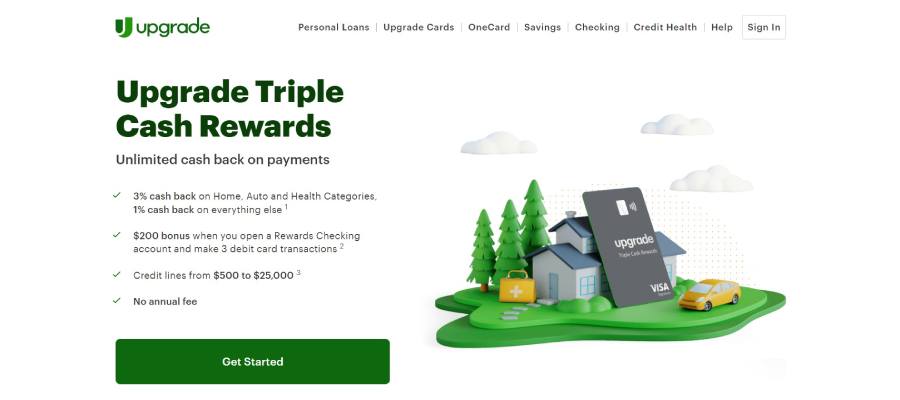
Upgrade is best for small loans due to its flexible loan amounts and repayment periods. Borrowers can receive loans ranging from $1,000 to $50,000. They can choose a repayment term of either 24 or 84 months. The lender also offers personal loan rates that vary depending on the borrower’s high credit score, with rates starting as low as 8.49% APR.
Upgrade caters to borrowers with fair or bad credit. However, borrowers with a high credit rating may be able to secure even better rates. Borrowers receive their loan as a lump sum, making it easy to manage and use for various purposes. While not the most popular lender, Upgrade has received positive customer reviews for its simple and efficient loan process.
Details
| APR | Min. Credit Score | Loan Amount | Repayment Terms | Process Time |
| 8.49% to 35.97% | 560 | From $1,000 to $50,000 | 24 – 84 months | 4 – 5 business days |
The application process is fast, and funds can be received within a few business days. Upgrade also provides a free credit score monitoring service. This lender is the best if you do not have ideal credit and need cash quickly!
About The Lender
Upgrade is a reputable lending platform that provides unsecured personal loans to borrowers with varying credit scores. The lender offers loans ranging from $1,000 to $50,000. The loan terms are between 24 to 84 months.
Upgrade’s personal loan interest rates start at 8.49%, which is lower than the average rates for personal loans. They also offer borrowers with low credit scores the opportunity to receive funding, making it an accessible option for those who may not qualify for a bank loan.
Upgrade’s application process includes a soft credit check, which does not impact the borrower’s score, and funds can be received within a few business days. Upgrade is a reliable lender that can benefit borrowers with excellent or bad credit looking for a personal loan.
Eligibility Criteria
To be eligible for a loan from Upgrade, applicants must meet certain criteria. The borrower must have a credit rating of 560. They also need a debt-to-income ratio of less than 45%.
The borrower should also have a consistent income source to ensure that they can make their monthly payments. The monthly payment and interest rate will depend on the loan amount, loan terms, and the borrower’s credit history. Upgrade also charges origination fees that range from 2.9% to 8%, depending on the borrower’s creditworthiness.
Although Upgrade is not a credit union, they offer low-interest personal loans. They can benefit borrowers with a good credit history. Meeting the minimum credit score requirements and having a consistent income source are the key factors for eligibility for a loan from Upgrade.
Advantages And Disadvantages
See below for the pros and cons of Upgrade.
Advantages:
- Low-interest personal loans: Upgrade offers low-interest best personal loans to borrowers with good credit, making it an attractive option for those seeking to consolidate high-interest debt.
- No prepayment charges: There are no prepayment fees with Upgrade, which allows borrowers to repay loans early without incurring additional charges.
- Fast funding: Loan funding is typically processed within a few business days, allowing borrowers to receive their funds quickly.
Disadvantages:
- Origination fee: There is an origination fee of up to 8% of the loan amount, which may be a significant expense for borrowers.
- Strict credit requirements: Upgrade requires a minimum credit score of 560, making it difficult for borrowers with not that excellent credit scores to qualify for a loan.
- Limited options for credit unions: Upgrade does not offer loans through credit unions, limiting the borrowing options for borrowers who prefer to work with these institutions.
Read More: Upgrade Review
Upstart — Best For Low Credit Borrowers
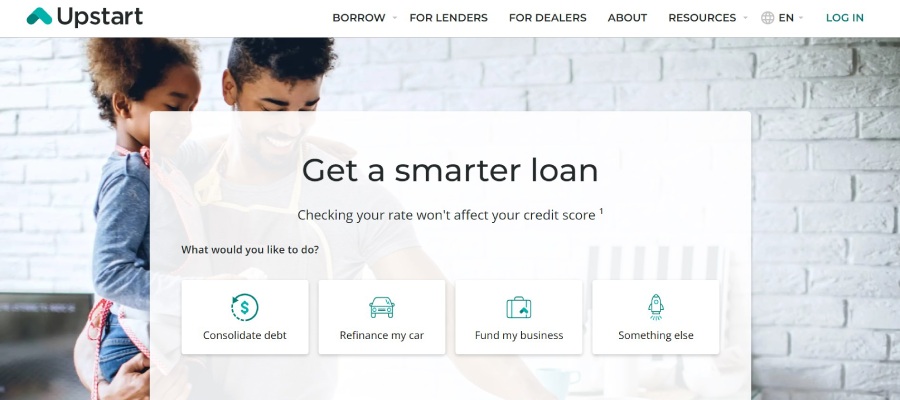
Upstart is best for bad credit borrowers because it considers more than just credit history when making lending decisions. The lender uses an algorithm that takes into account education, work experience, and other factors to assess creditworthiness. This is making it easier for those with low credit scores to qualify for loans.
Upstart also offers competitive loan terms, no prepayment penalties, and low origination fees. While not as well-known as some other lenders, Upstart has gained popularity in recent years for its innovative approach to lending. They are known for their willingness to work with borrowers who have less-than-perfect credit.
Details
| APR | Min. Credit Score | Loan Amount | Repayment Terms | Process Time |
| 7.8% to 35.99% | 300 | From $1,000 to $50,000 | 3 or 5 years | 1 business day |
Upstart offers competitive loan terms, with APR ranging from 7.8% to 35.99% and loan amounts ranging from $1,000 to $50,000. Its fast processing time of one business day is also a plus for borrowers who need quick access to funds.
About The Lender
Upstart is a lending platform that provides personal loans that are available for a diverse range of purposes, such as debt consolidation, major purchases, and home improvements. Unlike traditional lenders, Upstart uses AI that takes into account not only credit rating but also education and work experience to determine a borrower’s creditworthiness.
This approach allows Upstart to provide personal loans to borrowers with lower credit scores than many other lenders would consider. Upstart offers incredible interest, with APRs ranging from 7.8% to 35.99%. They also have loan terms of up to 60 months.
The lender has an 8% origination fee. But, there are no prepayment penalties, and borrowers can choose their own monthly payments. Upstart is a great option for borrowers with less-than-perfect credit.
Eligibility Criteria
To be eligible for a personal loan from Upstart, applicants must meet certain criteria, including having a minimum FICO credit score of 300. Upstart is more lenient than other lenders when it comes to credit ratings. Even applicants with fair or poor credit may still be considered.
Additionally, applicants must be employed or have a job offer with a start date within six months. They also must have a bank account. Upstart requires borrowers to have at least one credit account open.
They must provide recent pay stubs or other proof of income. Both secured and unsecured personal loans are provided by the lender. The loan terms and agreement will vary based on the borrower’s creditworthiness and other factors.
Advantages And Disadvantages
Here are the advantages and disadvantages of getting a personal loan from Upstart.
Advantages:
- Low credit score requirement: Upstart is a good option for borrowers who have a poor score, as it considers factors beyond credit history when assessing eligibility.
- Fast funding: Borrowers can receive their personal loan proceeds as soon as the next business day after approval.
- Fixed-rate personal loans: Upstart offers fixed-rate personal loans, which can assist borrowers in managing their monthly payments.
Disadvantages:
- Origination fee: Upstart charges an origination fee of 0% to 12%, which can increase the overall cost of the personal loan.
- High-interest rates: Upstart’s rates can be high, especially for borrowers with a low score.
- Limited terms: Borrowers can only choose between a 36 and 60-month repayment term, which may not be flexible enough for some borrowers.
Read More: Upstart Review
LightStream — Best For Debt Consolidation

LightStream is one of the online lenders that offer personal loans with low-interest rates and fixed monthly payments. It is best known for its debt consolidation loan options. This makes it an ideal option for borrowers who want to consolidate their high-interest debts into a single, more manageable loan.
LightStream also offers some of the best interest rates on the market, making it an attractive option for borrowers looking for a low-cost personal loan. While it may not be as well-known as some of the larger lenders, LightStream has a reputation for providing excellent customer service. They also have a streamlined online loan application process.
Details
| APR | Min. Credit Score | Loan Amount | Repayment Terms | Process Time |
| 7.99% – 20.99% | 660 | $5,000 – $100,000 | 24 – 36 months | 1 business day |
LightStream offers competitive rates and quick funding for personal loans. The lender’s quick funding process of just one business day makes it a reliable option. However, borrowers with lower scores may not be eligible for a personal loan.
About The Lender
LightStream is an online lender that provides personal loans typically used for debt consolidation, home improvement, and auto loans. They offer fixed interest rates that range from 7.99% to 20.99% and personal loan amounts from $5,000 to $100,000. The repayment term ranges from 24 to 36 months.
There is no origination fee or prepayment penalty. The lender has a minimum credit score requirement of 660 to qualify for a loan. They report to all three major credit bureaus. LightStream is considered a reliable lender with a reputation for offering competitive rates and excellent customer service. Their online application process is easy. The personal loan funds can be received as soon as the same day.
Advantages And Disadvantages
Here are some of the pros and cons of LightStream:
Advantages:
- Low-interest rates: LightStream offers some of the lowest interest rates in the market, making it an attractive option for borrowers looking to save money on interest charges.
- Flexible loan terms: With loan terms ranging from 24 to 144 months, borrowers have the flexibility to choose a repayment term that works best for them.
- No origination fees or prepayment penalties: LightStream does not charge origination fees or prepayment penalties, which can save borrowers hundreds or even thousands of dollars in fees.
Disadvantages:
- Strict credit requirements: LightStream has a credit requirement of 660, which may make it difficult for borrowers with less than stellar credit to qualify for a loan.
- No secured loans: LightStream only offers unsecured loans, which may not be the best option for borrowers who need to borrow large amounts of money or who have bad ratings.
- Online-only lender: LightStream is an online-only lender, which may not be ideal for borrowers who prefer to work with a lender in person or who have questions or concerns that they would like to discuss in person.
PenFed — Best For Credit Union Loans
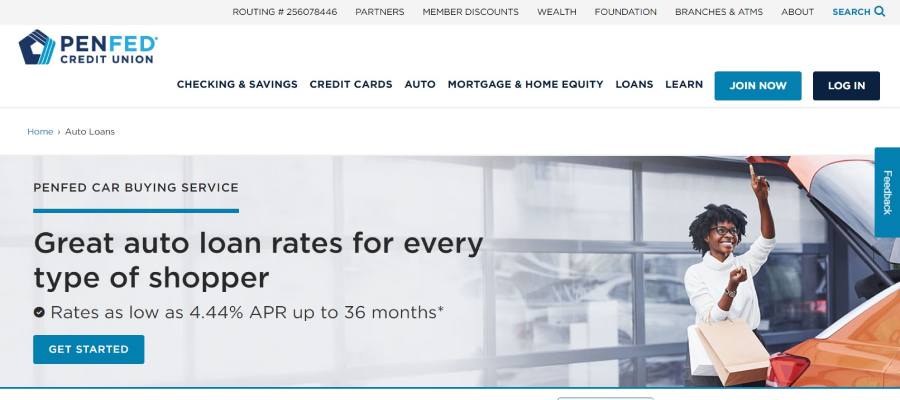
PenFed Credit Union offers competitive rates, flexible loan terms, and low fees. PenFed is a not-for-profit organization, which means it can offer lower interest rates and fewer fees than for-profit lenders.
PenFed also has a reputation for providing excellent customer service. They also have quick loan approval times. PenFed Credit Union loans are especially beneficial for borrowers with excellent credit who can take advantage of the lowest interest rate.
Additionally, PenFed offers a variety of loan options and terms. They are making it easier for borrowers to find a loan that fits their specific needs and budget. PenFed is a good lender for those looking for credit union loans.
Details
| APR | Min. Credit Score | Loan Amount | Repayment Terms | Process Time |
| 17.99% | 670 | $600 – $50,000 | 1 – 5 years | 48 hours |
PenFed offers loans with a great interest rate and flexible terms to borrowers with good credit. The lender is suitable for those who are members of a credit union and looking for quick personal loan processing times.
About The Lender
PenFed, or Pentagon Federal Credit Union, is a non-profit financial institution that provides banking services to military and government employees. It offers personal loan rates that are competitive with other unions and some online lenders.
The loan amounts range from $600 to $50,000. The repayment periods can be between 1 to 5 years. PenFed offers secured personal loans and unsecured ones.
The loan agreement and terms vary depending on the borrower’s credit score and financial history. PenFed is a reliable lender that has been in business for over 80 years. It is known for its excellent customer service and competitive interest rate.
Eligibility Criteria
To be eligible for a personal loan from PenFed, applicants must be a member of the credit union or join through an eligible organization. They must also have a credit score of 670. They must provide a verifiable income source, such as pay stubs.
The interest rate for their personal loan is 17.99%. PenFed may also require collateral for secured personal loans. The exact eligibility requirements may vary depending on the personal loan type and amount, as well as the applicant’s creditworthiness and other factors.
Advantages And Disadvantages
Here are some of the pros and cons of getting a PenFed personal loan:
Advantages:
- Low-interest personal loan rates: PenFed offers some of the lowest interest rates for personal loans, which can save borrowers money over time.
- No origination fee: Unlike many other lenders, PenFed does not charge an origination fee on its loans, which can help borrowers save money on upfront costs.
- Flexible terms: PenFed allows borrowers to choose terms between 1 and 5 years, which gives borrowers the flexibility to choose a repayment plan that fits their needs and budget.
Disadvantages:
- Membership requirement: To be eligible for a personal loan from PenFed, borrowers must become a member of the credit union, which may require additional time and effort.
- Excellent credit required: PenFed typically requires borrowers to have excellent credit to qualify for its lowest interest rates, which may make it difficult for some borrowers to get approved.
- Limited loan amounts: PenFed’s personal loan amounts range from $600 to $50,000, which may not be enough for borrowers who need to borrow a larger sum of money.
Read More: PenFed Credit Union Review
Happy Money — Best For Credit Card Debt Consolidation
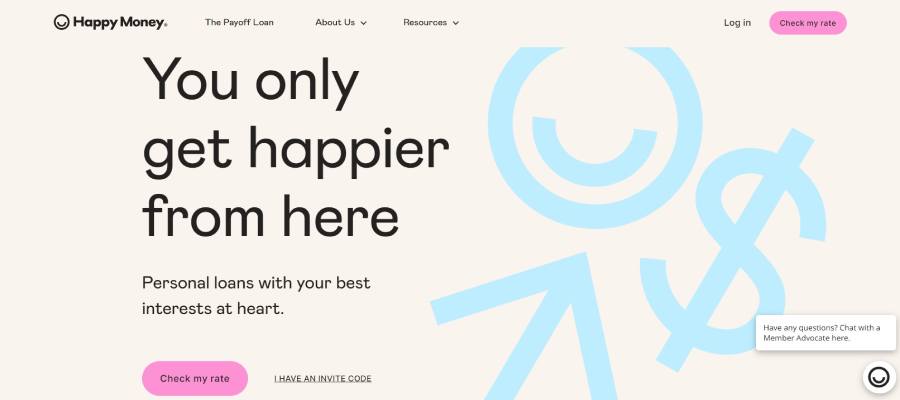
Happy Money is one of the best lenders for credit card debt consolidating. They offer loans at a lower interest rate than many credit cards. This can help borrowers save money on interest charges.
Additionally, they work with multiple lenders to help borrowers find the best personal loan option for their needs. While Happy Money may not be as well-known as some other lenders, they have a strong reputation for providing excellent customer service and transparent loan terms. They work with borrowers to find the best loan option.
Details
| APR | Min. Credit Score | Loan Amount | Repayment Terms | Process Time |
| 10.50% – 29.99% | 640 | $5,000 – $40,000 | 2 – 5 years | 48 hours |
This lender offers personal loans with reasonable rates and a quick approval process. However, a minimum credit rating is required to qualify.
About The Lender
Happy Money is a lender that provides the best personal loan options, particularly for credit card debts consolidation. The lender offers fixed-rate personal loans with competitive interest rates and loan amounts ranging from $5,000 to $40,000.
The process of applying is simple and easy to follow. Borrowers can get funds within 48 hours. Happy Money is considered a reliable lender due to its transparent lending practices, clear loan terms, and positive customer reviews.
Eligibility Criteria
Happy Money requires applicants to have a credit score of 640 to qualify for a personal loan. They also consider factors such as credit history, income, and debt-to-income ratio. To apply for a loan, applicants need to provide proof of income, such as recent pay stubs or tax returns.
Also, applicants need to have a valid bank account and provide personal information such as their address, phone number, and social security number. Meeting these eligibility criteria can increase the chances of being approved for a personal loan from Happy Money.
Advantages And Disadvantages
To help you make an informed decision, here are some of the pros and cons of Happy Money:
Advantages:
- Fast application process: Happy Money offers a quick and convenient online application that takes just a few minutes to finish, and borrowers can receive their funds in as little as 48 hours.
- Competitive interest rates: Happy Money’s interest rates are competitive with other online lenders, starting at 10.50% APR, making it a good option for those with fair to good credit.
- Zero prepayment fees: There are no penalties for prepayment, meaning borrowers can pay off their loans ahead of schedule without any extra charges.
Disadvantages:
- Limited loan amounts: Happy Money only offers loans up to $40,000, which may not be enough for borrowers who need larger sums of money.
- Not available in all states: Happy Money is currently not accessible in every state, which restricts its availability to borrowers in certain areas.
- No secured loans: Happy Money only offers unsecured personal loan options, which means borrowers with bad credit may not qualify or may receive a higher interest rate.
Wells Fargo — Best For Home Loans

Wells Fargo is a popular lender for home loans and is considered one of the best options for borrowers looking to finance their home purchase. Wells Fargo provides a range of loan options to cater to a variety of borrowers with different financial hardships. The bank offers both fixed and adjustable rate mortgages and allows borrowers to apply online or in person.
With a reputation for excellent customer service and competitive rates, Wells Fargo is a top choice for homebuyers. They also have a wide range of loan amount options available, making it easy for borrowers to find a loan that fits their needs. Wells Fargo’s expertise in the mortgage industry and a broad range of loan options make it an ideal choice for homebuyers.
Details
| APR | Min. Credit Score | Loan Amount | Repayment Terms | Process Time |
| 7.49% | 620 | $3,000 – $100,000 | 12 – 84 months | 24 hours |
Wells Fargo offers a personal loan with competitive APR rates, a relatively low credit rating requirement, and a quick application process. Loan amounts are flexible, and repayment periods are longer than many other personal loan providers.
About The Lender
Wells Fargo is a financial institution that offers a variety of lending products, including home loans, personal loans, and student loans. It is one of the largest and most well-known banks in the United States. They have a history dating back to 1852.
Wells Fargo works by reviewing the creditworthiness and financial history of potential borrowers. This way, they determine their eligibility for loans. The lender is generally considered to be reliable due to its long history and wide range of financial products and services.
Eligibility Criteria
To be eligible for a loan from Wells Fargo, applicants need a credit score of 620 and must meet the bank’s income and debt requirements. Individuals with elevated credit scores and reduced debt-to-income ratios have higher chances of meeting the requirements for a lower interest rate.
Wells Fargo also considers factors such as the loan amount and repayment term when determining eligibility. The bank may require collateral for larger loan amounts or for borrowers with less established credit histories.
Meeting the eligibility criteria does not guarantee loan approval, and borrowers may be subject to additional credit checks and verification of their financial information.
Advantages And Disadvantages
In order to evaluate a lender, you must compare both pros and cons:
Advantages:
- Loan funding: Wells Fargo is known for its fast loan funding, often within 24 hours of approval. This can be a major advantage for borrowers who need funds quickly.
- Large loan amounts: Wells Fargo offers large loan amounts of up to $100,000, which can be helpful for those who need to finance major expenses such as home renovations or consolidating debt.
- Relationship discounts: Wells Fargo provides interest rate discounts for customers who have a qualifying Wells Fargo checking account, which can lead to significant savings over the life of the loan.
Disadvantages:
- High minimum credit score: Wells Fargo requires a credit score of 620, which can be difficult for borrowers with poor credit to meet.
- Limited transparency: Some borrowers have reported that Wells Fargo’s application process and terms are not as transparent as those of other lenders.
- Limited availability: Wells Fargo has a limited branch network compared to other large banks, which can make it difficult for some borrowers to access their services.
How to Choose The Best Low-Interest Personal Loan Lenders
Choosing the best low-interest personal loan lender is crucial for securing the best deal. Factors to consider include the lender’s reputation, interest rates, fees, eligibility criteria, loan amounts, and repayment times. It’s also essential to compare multiple lenders to find the best offer.
Look for lenders that provide pre-qualification options to avoid unnecessary credit score hits. Moreover, always read the loan agreement carefully and ask any questions that arise. By considering these factors, borrowers can find a lender that suits their needs and budget, with transparent terms and quick loan funding.
Personal Loan Interest Rates
Comparing APRs of low-interest personal loans is crucial when choosing the best loan option. APR stands for Annual Percentage Rate, which represents the cost of borrowing, including both interest rate and fees charged by the lender. When comparing APRs, borrowers should look for the lowest rate possible, as it means lower overall borrowing costs.
It’s important to note that APRs can vary based on factors such as credit score, loan amount, and repayment term. Additionally, borrowers should consider the impact of any additional fees, such as origination fees, which may be added to the loan. By carefully comparing APRs, borrowers can find the best low-interest personal loan for their needs.
Loan Amount
The loan amount is crucial when comparing low-interest personal loans. Lenders usually offer a range of loan amounts, and borrowers need to ensure that they get the amount that they require. Borrowers should take note of the minimum and maximum loan amounts that lenders offer and check if these amounts align with their needs.
Moreover, borrowers should also compare interest based on the loan amount they need. Lenders may have varying interest for different loan amounts. Borrowers should choose a lender that offers a reasonable interest rate for the loan amount they require.
Required Credit Score
Credit rating is an essential factor when it comes to comparing low-interest personal loans. A higher credit score will qualify the borrower for lower personal loan interest rates and better terms. To check their credit, users can request a free credit report once a year from any of the three credit reporting agencies.
It’s also possible to use free credit services available online. But, users should be cautious of scams and only use reputable websites. Checking credit beforehand helps borrowers understand which lenders they’re eligible for and what rates they may qualify for.
Repayment Terms
Repayment periods are important to consider when choosing a low-interest personal loan. They determine how long it will take to pay off the loan and how much interest will be paid over the life of the loan. Longer repayment times generally mean lower monthly payments but more interest paid in total.
Shorter repayment times mean higher monthly payments but less interest paid overall. It’s important to choose repayment periods that are manageable for the user’s budget and financial situation. The loan needs to be paid off as quickly and cost-effectively as possible.
Read More: Direct Lenders Like SpotLoan & Similar Loans
What Are the Low-Interest Personal Loans?
Low-interest personal loans are loans that come with low annual percentage rates (APRs), making them an affordable financing option for borrowers. These loans are typically unsecured, meaning that they don’t require any collateral, such as a house or car.
Borrowers can use the funds from a low-interest personal loan payment for a variety of purposes, including debt consolidating, home improvement, medical bills, or major purchases. The loan amount, interest rate, and repayment times are based on the borrower’s creditworthiness.
These loans are typically available through traditional banks and online lending companies, and can be applied for and funded quickly in many cases.
Pros and Cons of Low-Interest Personal Loans
Here are some of the advantages and disadvantages you might face:
Pros:
- Lower interest rates than credit cards or other types of loans, which can save borrowers money over time.
- Flexible repayment periods, allowing borrowers to choose a loan length that works for their budget and financial goals.
- Accessible to borrowers with good credit, making it easier for them to obtain loans for larger amounts.
Cons:
- Only available to borrowers with good credit scores, which can make it difficult for those with poor credit to obtain low-interest personal loans.
- Some lenders charge origination fees, which can increase the overall cost of the loan.
- Longer repayment times can result in more interest paid over time, which can negate the benefits of a low rate.
How to Apply For Low-Interest Personal Loan
Here is a step-by-step guide on how to apply for a low-interest personal loan:
- Research and compare different lenders: Compare interest rates, loan amounts, repayment times, and eligibility criteria for various low-interest personal loan lenders.
- Check your credit score: Check your credit score to see if you meet the minimum requirements for the lender you want to apply to.
- Gather required documents: Collect all necessary documents such as ID, proof of income, and bank statements.
- Fill out the application: Complete the application form accurately and provide all necessary information.
- Review loan terms: If approved, review the terms, including the interest rate, repayment term, and any fees.
- Accept loan offer: If you agree to the terms, accept the loan offer and sign the agreement.
- Receive funds: Once you sign the agreement, the funds will be deposited into your account within a few business days.
Applying For Low-Interest Personal Loans With Bad Credit
It’s possible to get a low-interest personal loan with bad credit, but it can be more difficult. Lenders may require a higher credit score or may charge higher interest rates. Some lenders specialize in loans for people with bad credit, so it’s important to research and compare different options. Additionally, providing collateral or a co-signer can increase the chances of approval.
Alternatives to Low-interest Personal Loans
There are alternatives to low-interest personal loans that can help individuals meet their financial needs. One option is to apply for a balance transfer credit card with a low or zero introductory interest rate. Another option is to borrow from a friend or family member or consider a home equity loan or line of credit.
It’s important to carefully consider all options and choose the one that best fits your financial situation and goals. Below are some of the possibilities.
Home Equity Loan or Line of Credit
A home equity loan or line of credit is a type of loan that allows homeowners to borrow against the equity in their home. It is a low-interest personal loan because the loan is secured by the value of the home.
This type of loan can be useful when large sums of money are needed for home renovations, consolidating debt, or other major expenses. However, it’s important to keep in mind that the home is used as collateral. This means that if payments are missed, the lender can take possession of the home.
Friends and Family
Borrowing from friends and family involves getting a loan from people you know. This option can be a good choice if you have a good relationship with your lender and they are willing to lend you the money. However, borrowing from friends and family can be risky and potentially strain relationships if you are unable to repay the loan as agreed.
0% APR Credit Card
A 0% APR credit card is a credit card that offers a zero-interest introductory period. During this period, typically between 6 and 18 months, no interest is charged on purchases made with the card. This makes it a low-interest personal loan option. However, it’s important to keep in mind that after the introductory period, the interest rate can increase significantly.
Read More: Best Personal Loan Companies and Lenders
Conclusion
Finding the best personal loan with good interest in 2024 requires careful consideration of several factors, such as the loan amount, repayment times, and the lender’s reputation. The loans that made it to the top of the list in 2024 are offered by credible lenders with competitive rates, flexible terms, and minimal fees.
It’s always advisable to compare offers from different lenders before making a decision to ensure you get the best deal possible. Overall, taking out a personal loan can be a wise financial decision for those who need to finance a large purchase or consolidate debt, as long as they can afford the monthly payments.
Sources Used in Research for the Article:
- Getting Approved, Happy Money, https://happymoney.com/getting-approved
- Your Credit History, National Credit Union Administration, https://mycreditunion.gov/life-events/consumer-loans/credit-reports-scores
- Home Equity Loans & Lines of Credit, National Credit Union Administration, https://mycreditunion.gov/life-events/consumer-loans/home-equity

